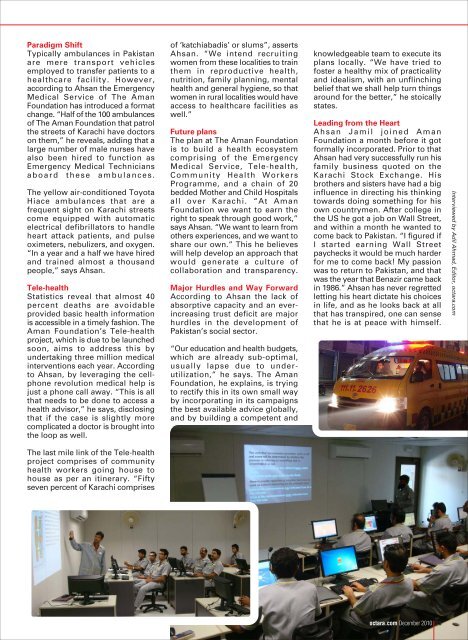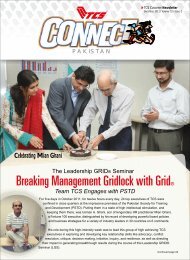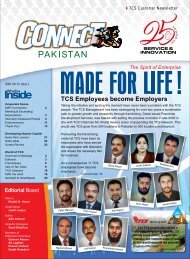PDF Version - TCS Courier
PDF Version - TCS Courier
PDF Version - TCS Courier
Create successful ePaper yourself
Turn your PDF publications into a flip-book with our unique Google optimized e-Paper software.
Paradigm Shift<br />
Typically ambulances in Pakistan<br />
are mere transport vehicles<br />
employed to transfer patients to a<br />
healthcare facility. However,<br />
according to Ahsan the Emergency<br />
Medical Service of The Aman<br />
Foundation has introduced a format<br />
change. “Half of the 100 ambulances<br />
of The Aman Foundation that patrol<br />
the streets of Karachi have doctors<br />
on them,” he reveals, adding that a<br />
large number of male nurses have<br />
also been hired to function as<br />
Emergency Medical Technicians<br />
aboard these ambulances.<br />
The yellow air-conditioned Toyota<br />
Hiace ambulances that are a<br />
frequent sight on Karachi streets<br />
come equipped with automatic<br />
electrical defibrillators to handle<br />
heart attack patients, and pulse<br />
oximeters, nebulizers, and oxygen.<br />
“In a year and a half we have hired<br />
and trained almost a thousand<br />
people,” says Ahsan.<br />
Tele-health<br />
Statistics reveal that almost 40<br />
percent deaths are avoidable<br />
provided basic health information<br />
is accessible in a timely fashion. The<br />
Aman Foundation’s Tele-health<br />
project, which is due to be launched<br />
soon, aims to address this by<br />
undertaking three million medical<br />
interventions each year. According<br />
to Ahsan, by leveraging the cellphone<br />
revolution medical help is<br />
just a phone call away. “This is all<br />
that needs to be done to access a<br />
health advisor,” he says, disclosing<br />
that if the case is slightly more<br />
complicated a doctor is brought into<br />
the loop as well.<br />
The last mile link of the Tele-health<br />
project comprises of community<br />
health workers going house to<br />
house as per an itinerary. “Fifty<br />
seven percent of Karachi comprises<br />
of ‘katchiabadis’ or slums”, asserts<br />
Ahsan. “We intend recruiting<br />
women from these localities to train<br />
them in reproductive health,<br />
nutrition, family planning, mental<br />
health and general hygiene, so that<br />
women in rural localities would have<br />
access to healthcare facilities as<br />
well.”<br />
Future plans<br />
The plan at The Aman Foundation<br />
is to build a health ecosystem<br />
comprising of the Emergency<br />
Medical Service, Tele-health,<br />
Community Health Workers<br />
Programme, and a chain of 20<br />
bedded Mother and Child Hospitals<br />
all over Karachi. “At Aman<br />
Foundation we want to earn the<br />
right to speak through good work,”<br />
says Ahsan. “We want to learn from<br />
others experiences, and we want to<br />
share our own.” This he believes<br />
will help develop an approach that<br />
would generate a culture of<br />
collaboration and transparency.<br />
Major Hurdles and Way Forward<br />
According to Ahsan the lack of<br />
absorptive capacity and an everincreasing<br />
trust deficit are major<br />
hurdles in the development of<br />
Pakistan’s social sector.<br />
“Our education and health budgets,<br />
which are already sub-optimal,<br />
usually lapse due to underutilization,”<br />
he says. The Aman<br />
Foundation, he explains, is trying<br />
to rectify this in its own small way<br />
by incorporating in its campaigns<br />
the best available advice globally,<br />
and by building a competent and<br />
knowledgeable team to execute its<br />
plans locally. “We have tried to<br />
foster a healthy mix of practicality<br />
and idealism, with an unflinching<br />
belief that we shall help turn things<br />
around for the better,” he stoically<br />
states.<br />
Leading from the Heart<br />
Ahsan Jamil joined Aman<br />
Foundation a month before it got<br />
formally incorporated. Prior to that<br />
Ahsan had very successfully run his<br />
family business quoted on the<br />
Karachi Stock Exchange. His<br />
brothers and sisters have had a big<br />
influence in directing his thinking<br />
towards doing something for his<br />
own countrymen. After college in<br />
the US he got a job on Wall Street,<br />
and within a month he wanted to<br />
come back to Pakistan. “I figured if<br />
I started earning Wall Street<br />
paychecks it would be much harder<br />
for me to come back! My passion<br />
was to return to Pakistan, and that<br />
was the year that Benazir came back<br />
in 1986.” Ahsan has never regretted<br />
letting his heart dictate his choices<br />
in life, and as he looks back at all<br />
that has transpired, one can sense<br />
that he is at peace with himself.<br />
octara.com December 2010 25<br />
Interviewed by Adil Ahmad, Editor, octara.com









